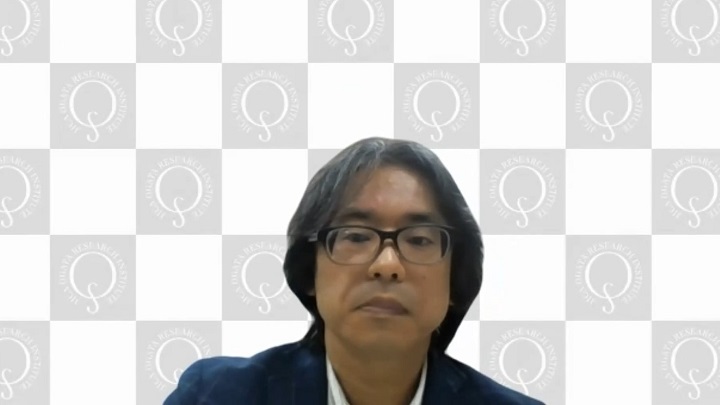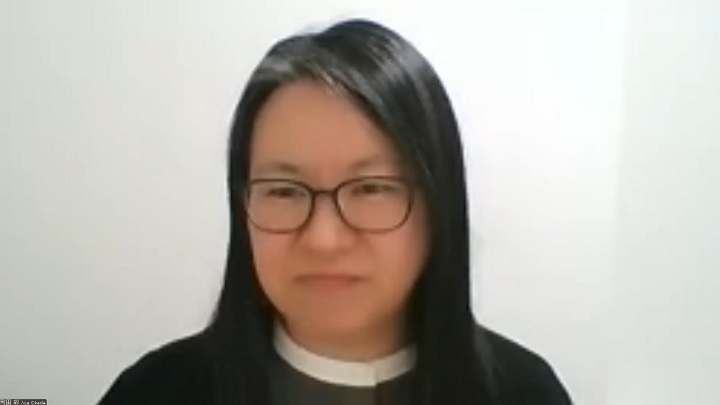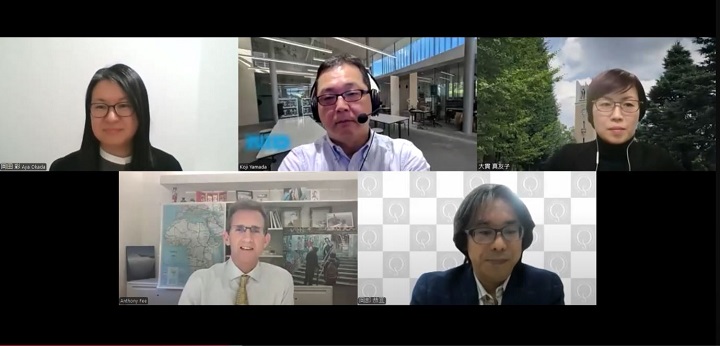Book-Launch Seminar Held for “State-Managed International Voluntary Service: The Case of Japan Overseas Cooperation Volunteers”
2025.02.07
On Dec. 2, 2024, the JICA Ogata Sadako Research Institute for Peace and Development (JICA Ogata Research Institute) held a book-launch seminar for “State-Managed International Voluntary Service: The Case of Japan Overseas Cooperation Volunteers ” as the final deliverable of the research project “Contributions of International Volunteers in Bringing Change to Developing Countries and Shaping a Global Civil Society.”
This book presents the concept of “State-managed International Voluntary Services” (SMIVS) and analyzes the contribution of the Japan Overseas Cooperation Volunteers (JOCV) program to both hosting countries and Japan. The book also examines the advantages and disadvantages, significance, and potential of SMIVS from broad perspectives by 16 authors.
Following opening remarks by Miyahara Chie , Director General of the JICA Ogata Research Institute, the editor Okabe Yasunobu, who is a Visiting Fellow at the JICA Ogata Research Institute and a professor at Tohoku University, gave an outline of the book. First, Okabe touched on one of the arguments made in the book, that the JOCV program provides both “downstream” and “upstream” benefits. The downstream benefits are the development of the host countries or communities, while the upstream benefits are the volunteers' own personal and professional growth, contributions to Japanese society, and the advancement of international friendship and mutual understanding. He also presented an overview of each chapter, while also making note of comparisons between the state-managed JOCV program and international volunteer programs managed by NGOs.

Okabe Yasunobu, Visiting Fellow at the JICA Ogata Research Institute gives an outline of the book.
Next, in her review, Professor Okada Aya of Tohoku University pointed out three characteristics of the JOCV program: 1) the program may be influenced by the priorities of the Japanese government; 2) it has multiple objectives, such as contributing to the economic and social development and reconstruction of developing countries, deepening mutual understanding and fostering coexistence in cross-cultural societies; and 3) the volunteers dispatched through the program do not have high levels of expertise. Okada remarked that the weak expertise of the volunteers may be interpreted as weakness of the program, but this book can help us understand such characteristics can be strengths as well.
Moreover, she noted that the book has implications for a wide range of academic fields, including international cooperation, development studies, civil society, and career education, and expressed her expectations for the potential breadth of its readership.

Professor Okada Aya of Tohoku University gives her review of the book.
At the roundtable discussion moderated by Okabe, some of the book's authors made remarks on a variety of topics, including the significance of the book's publication and its target audience, characteristics of the JOCV program, and research prospects.
Okabe began by commenting that as the first book on the JOCV program written in English, it provides an opportunity for international readers to learn about the program. Okada reiterated that it is significant how it delves into the overall picture of state-managed international voluntary services.
Anthony Fee, Senior Lecturer at the University of Technology, Sydney, co-authored Chapter 10 which discusses the legitimacy of state-managed voluntary services. He said that the different demands for “upstream” domestic benefits and “downstream” development benefits can create tensions, but the book makes the appropriate argument that state-managed programs can balance those tensions. He also noted that state-managed programs, characterized by long-term peer-to-peer interactions between volunteers and their local counterparts, allow for genuine reciprocity and equality.
Yamada Koji, Visiting Professor at Musashino University (formerly at JICA), who authored Chapter 7 on the role of JICA country office staff, stated that one of the advantages of state-managed international volunteer activities is that even if individual members do not have high levels of expertise, they can complement each other to create comprehensive expertise as a whole by working together. For example, when designing an assistive device for people with disabilities, a product designer alone may not be able to come up with a device that meets the needs of the users. However, if an occupational therapist is involved in the design process, a better device may be proposed. He stressed that good collaboration between volunteers can create opportunities for open innovation.
Onuki Mayuko, Assistant Professor at Waseda University (former research fellow at the JICA Ogata Research Institute), who authored Chapter 5, analyzed how returned JOCVs made contributions to Japanese society a decade after returning to Japan. She commented that the program provides extensive support for returned volunteers to network with each other and engage in community activities Japan. She added that JOCV provides more generous support for career development than other international volunteer programs, owing to its state management and budget allocation, and returned JOCVs are expected to make wide-ranging social contributions.

Clockwise from upper-left: Okada Aya, Professor at Tohoku University; Yamada Koji, Visiting Professor at Musashino University; Onuki Mayuko, Assistant Professor at Waseda University; Okabe Yasunobu, Visiting Fellow at the JICA Ogata Research Institute; and Anthony Fee, Senior Lecturer at University of Technology Sydney
Tachibana Hideharu, Director General, Secretariat of Japan Overseas Cooperation Volunteers, closed the event by saying that 2025 will mark the 60th anniversary since the launch of the JOCV program, and expressed his expectation that the value of this project will be disseminated to a broader audience.
A video recording of this seminar can be watched from the link below.

事業事前評価表(地球規模課題対応国際科学技術協力(SATREPS)).国際協力機構 地球環境部 . 防災第一チーム. 1.案件名.国 名: フィリピン共和国.

事業事前評価表(地球規模課題対応国際科学技術協力(SATREPS)).国際協力機構 地球環境部 . 防災第一チーム. 1.案件名.国 名: フィリピン共和国.

事業事前評価表(地球規模課題対応国際科学技術協力(SATREPS)).国際協力機構 地球環境部 . 防災第一チーム. 1.案件名.国 名: フィリピン共和国.

事業事前評価表(地球規模課題対応国際科学技術協力(SATREPS)).国際協力機構 地球環境部 . 防災第一チーム. 1.案件名.国 名: フィリピン共和国.

事業事前評価表(地球規模課題対応国際科学技術協力(SATREPS)).国際協力機構 地球環境部 . 防災第一チーム. 1.案件名.国 名: フィリピン共和国.
scroll